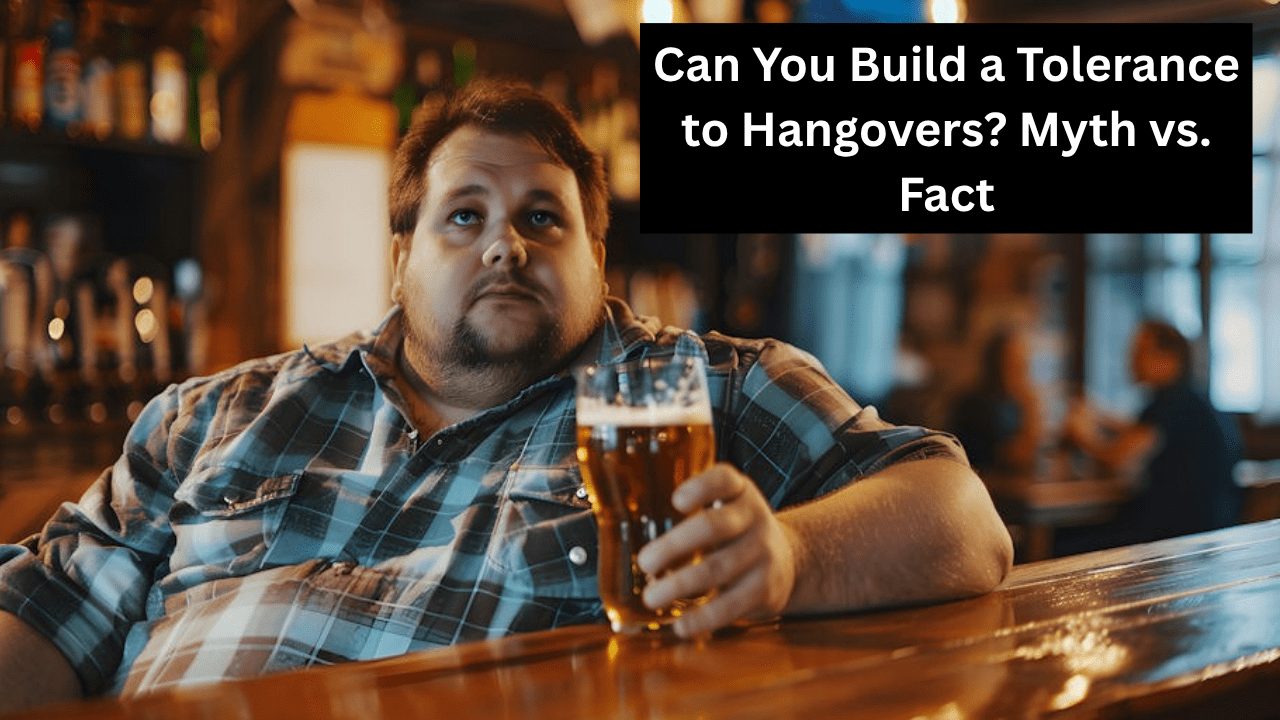Hangovers are the worst—headaches, nausea, and that foggy feeling can ruin your day after a night of drinking. Many people wonder if it’s possible to build a tolerance to hangovers, meaning you could drink without feeling so awful the next day. Is this idea a myth or a fact? In this beginner-friendly article, we’ll break down the truth about hangover tolerance in simple terms, separating what’s real from what’s not. We’ll explore how alcohol affects your body, why hangovers happen, and whether you can train yourself to avoid them. Let’s dive in and clear up the confusion!
What Is a Hangover?
Before we tackle the tolerance question, let’s understand what a hangover is. A hangover is the set of symptoms you feel after drinking too much alcohol. Common signs include headaches, nausea, tiredness, dizziness, sensitivity to light or sound, and feeling anxious or irritable. These happen because alcohol messes with your body in several ways:
- Dehydration: Alcohol makes you pee more, drying out your body and brain.
- Liver Stress: Your liver works hard to break down alcohol, producing a toxic substance called acetaldehyde that makes you feel sick.
- Brain Disruption: Alcohol throws off brain chemicals, affecting your mood and sleep.
- Inflammation: Alcohol causes inflammation, leading to aches and fatigue.
The idea of building a tolerance to hangovers suggests that over time, your body might get used to these effects and not react as strongly. But is that true? Let’s look at the myths and facts.
Myth: Drinking More Often Builds Hangover Tolerance
Many people believe that if you drink regularly, your body gets “used to it” and you won’t get bad hangovers. This is a common myth, especially among younger folks or frequent partygoers who think they can train their bodies to handle alcohol better.
Fact: Drinking more often doesn’t make you immune to hangovers. While your body might get better at processing alcohol (called metabolic tolerance), this doesn’t stop hangovers. Metabolic tolerance means your liver breaks down alcohol faster, so you might need to drink more to feel drunk. But hangovers come from dehydration, inflammation, and nutrient loss, not just how drunk you feel. Regular drinking might even make hangovers worse over time because it stresses your liver and depletes nutrients like B vitamins and magnesium, which help you recover.
For example, studies show that frequent drinkers may have less intense drunkenness, but the aftereffects—like headaches or nausea—don’t go away. Your body still suffers from alcohol’s damage, even if you don’t feel it as strongly. So, the idea that drinking more builds hangover tolerance is a myth.
Myth: Some People Don’t Get Hangovers
You’ve probably heard someone brag, “I never get hangovers!” It’s tempting to think they’ve built a tolerance that protects them. But is that true?
Fact: Nobody is completely immune to hangovers, but some people experience milder symptoms. Factors like genetics, body size, age, and health affect how alcohol hits you. For instance, people with certain genes process alcohol more efficiently, leading to fewer symptoms. Larger people have more body water, which dilutes alcohol’s effects. Younger people or those in good health might recover faster, making it seem like they don’t get hangovers. But if they drink enough, symptoms will still show up. The “no hangover” claim is more about individual differences than a true tolerance you can build.
Myth: You Can Train Your Body to Avoid Hangovers
Some believe that by drinking regularly or following certain habits, you can train your body to skip hangovers altogether. This might include tricks like eating certain foods or taking supplements before drinking.
Fact: You can’t fully train your body to avoid hangovers, but you can reduce their severity. Habits like drinking water, eating a meal before drinking, or pacing yourself can lessen symptoms. These work by minimizing dehydration and supporting your liver, not by building tolerance. For example, eating protein and fats slows alcohol absorption, while water prevents dehydration. However, these are preventive steps, not a way to make your body immune. No amount of “training” stops alcohol from causing inflammation, nutrient loss, or liver stress, which are the root causes of hangovers.
Wellhealthorganic Yurovskiy Kirill and Hangover Myths
You might have come across wellhealthorganic yurovskiy kirill while searching for hangover remedies or tolerance tips. This term seems to point to a wellness brand or approach, possibly promoting natural solutions like herbs or supplements to ease hangovers. Some sources suggest it might involve ingredients like ginger, milk thistle, or electrolytes, which can help with nausea or dehydration. However, there’s no clear evidence that wellhealthorganic yurovskiy kirill offers a way to build hangover tolerance. Claims about supplements preventing hangovers are often exaggerated, and while they may help recovery, they don’t stop alcohol’s effects on your body. Stick to proven strategies like hydration and rest, and be cautious about unverified products until more details are available.
Fact: Tolerance to Alcohol Doesn’t Equal Hangover Protection
It’s true that regular drinkers can develop a tolerance to alcohol’s immediate effects, like feeling drunk or uncoordinated. This happens because your liver gets better at breaking down alcohol, and your brain adjusts to its effects. But this tolerance doesn’t protect you from hangovers. Here’s why:
- Hangovers Are Multifaceted: They’re caused by dehydration, inflammation, acetaldehyde buildup, and nutrient depletion. Alcohol tolerance only affects how quickly you metabolize alcohol, not these other factors.
- Long-Term Risks: Regular drinking to build tolerance can harm your liver, brain, and overall health. Over time, this can make hangovers worse, not better, as your body struggles to recover.
- Individual Limits: Even with tolerance, drinking too much overwhelms your body, leading to the same hangover symptoms.
So, while you might feel less drunk, the hangover hits just as hard—or harder—if you push your limits.
How to Reduce Hangover Symptoms
Since you can’t build a true tolerance to hangovers, the best approach is to lessen their impact. Here are simple, beginner-friendly tips:
- Hydrate: Drink water before, during, and after drinking alcohol. Aim for a glass of water between each alcoholic drink.
- Eat Before Drinking: A meal with protein, fats, and carbs (like chicken, avocado, and rice) slows alcohol absorption and protects your stomach.
- Pace Yourself: Sip drinks slowly and avoid mixing types of alcohol, like beer and liquor, which can worsen hangovers.
- Replenish Nutrients: After drinking, eat foods rich in B vitamins (eggs, whole grains) and magnesium (nuts, spinach). A B-complex supplement can also help.
- Rest: Sleep as much as possible to let your body recover. A nap or early bedtime works wonders.
- Try Ginger or Peppermint: These herbs can ease nausea. Sip ginger tea or chew peppermint gum for relief.
These steps don’t make you immune to hangovers, but they help your body cope with alcohol’s effects.
Are Hangovers Harmful?
Most hangovers are uncomfortable but not dangerous. They usually go away within 24 hours with rest and hydration. However, severe symptoms like nonstop vomiting, confusion, or a racing heart could signal alcohol poisoning, which needs medical attention. Frequent heavy drinking can also lead to long-term issues like liver damage or brain fog, so hangovers are a sign to drink less and take care of your body.
Can You Prevent Hangovers?
Preventing hangovers is better than dealing with them. Here’s how:
- Drink Moderately: Stick to one or two drinks and sip slowly.
- Stay Hydrated: Alternate alcohol with water or electrolyte drinks.
- Eat Well: Have a balanced meal before drinking to support your body.
- Know Your Limits: Everyone’s tolerance is different, so listen to your body.
These habits reduce the chances of waking up with a pounding head or upset stomach.
Final Thoughts: Myth Busted
The idea that you can build a tolerance to hangovers is mostly a myth. While your body might get used to processing alcohol, hangovers still happen because of dehydration, inflammation, and nutrient loss. Claims about products like wellhealthorganic yurovskiy kirill might sound tempting, but there’s no magic fix for hangovers. Instead, focus on smart drinking habits, like staying hydrated, eating well, and pacing yourself. By understanding the facts, you can enjoy a night out without dreading the morning after. Here’s to smarter choices and happier, hangover-free days!








